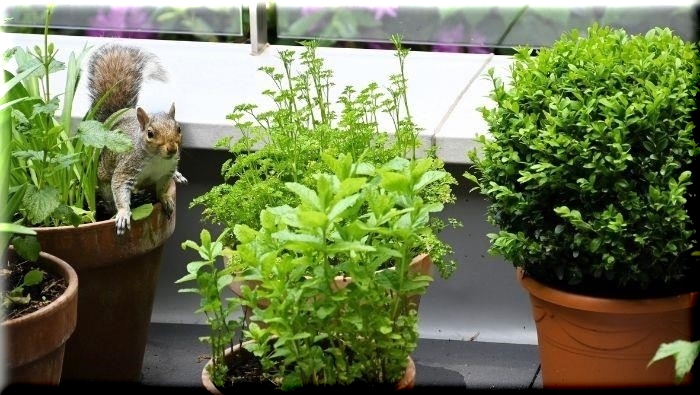Garden
How to Keep Squirrels Out of Your Garden: Understanding Their Behavior and Effective Deterrents
Squirrels can be a real nuisance in the garden, especially when they decide to make your plants their next meal. From nibbling on tomatoes to digging up bulbs, these furry creatures can quickly wreak havoc on your carefully cultivated landscape. But don’t worry, there are humane and effective ways to keep them at bay. In this article, we’ll explore strategies for understanding squirrel behavior and implementing effective deterrents to protect your garden from these pesky rodents.
Understanding Squirrel Behavior and Prevention
Squirrels are naturally curious and opportunistic foragers. They’re attracted to gardens by the abundance of food sources, water, and shelter. Knowing what entices squirrels to your garden is the first step in keeping them away.
What Attracts Squirrels to Gardens?
Squirrels are drawn to a variety of food sources, including seeds, fruits, vegetables, and even bird feeders. They also need water, so a birdbath or other water source in your yard can attract them. Finally, squirrels seek shelter in trees, bushes, and even under garden structures. So, the presence of these features in your yard can make your garden an attractive place for squirrels to settle in.
Preventing Access: Fencing and Bird Feeders
One effective way to keep squirrels out of your garden is to create barriers that prevent them from entering. Installing a fence around your garden is a great way to physically deter squirrels. You can use wire, wood, or other sturdy materials to create a secure barrier.
- Fencing Material: Wire fencing, particularly chicken wire, is very effective in keeping squirrels out, but make sure the mesh size is small enough so that squirrels can’t squeeze through.
- Fencing Height: A fence that is at least 6 feet high is recommended to prevent squirrels from climbing over.
- Squirrel-Proof Fencing: To make your fence even more squirrel-proof, consider burying the bottom of the fence several inches underground to prevent them from digging under.
Bird feeders can be a major attraction for squirrels. To reduce the chances of squirrels raiding your bird feeders, try placing them a distance away from your garden. You can also look for feeders specifically designed to be squirrel-proof.
Understanding Squirrel Habits:
Squirrels tend to be more active in the morning and late afternoon, so they may be more likely to visit your garden during these times. Understanding their foraging patterns and active times of day can help you time your preventative measures accordingly. Furthermore, remember that squirrels are adaptable creatures and can learn to overcome obstacles.
Effective Deterrents for Squirrels
Once you understand what attracts squirrels to your garden and their habits, you can start putting some deterrents in place.
Repellents:
Repellents can be a useful tool for deterring squirrels. Some options include:
- Natural Repellents: Cayenne pepper, marigolds, red fox urine, used cat litter, and peppermint oil are all natural repellents that have been known to deter squirrels.
- Commercial Repellents: Commercial repellents, such as hot pepper wax spray, are also available. You can spray these products on your plants to create a barrier that squirrels find unpleasant.
- Tips for Using Repellents: Be sure to apply repellents according to the manufacturer’s instructions. It is often necessary to reapply repellents after rain or heavy wind.
Physical Deterrents:
Physical deterrents can also be effective. Some popular options include:
- Toy Snakes: Squirrels are afraid of snakes, so placing a few toy snakes strategically around your garden can deter them from entering.
- Motion-Activated Sprinklers: Motion-activated sprinklers can startle squirrels and discourage them from approaching.
- Ultrasonic Devices: Ultrasonic devices emit high-frequency sounds that are unpleasant to squirrels and can help keep them away.
Other Strategies:
- Alternative Food Sources: Providing squirrels with alternative food sources away from your garden, such as a dedicated squirrel feeder, can help reduce the likelihood of them raiding your plants.
- Water Sources: If you have a bird bath, consider placing it away from your garden. Squirrels are often attracted to water, so providing them with a dedicated water source may deter them from visiting your garden.
Protecting Specific Plants
While deterrents can help keep squirrels away from your entire garden, you may need to take extra steps to protect specific plants, particularly those that are most appealing to squirrels.
Protecting Tomatoes:
Squirrels love to nibble on ripe tomatoes. To protect your tomatoes, you can use cages to create a barrier around them. Row covers can also be used to protect plants from squirrels. Another strategy is to grow your tomatoes in a raised garden bed.
Protecting Other Plants:
You can use individual plant cages to protect other plants that are vulnerable to squirrel damage. Mulching around plants can also help deter squirrels from digging. Lastly, consider strategic plant placement. Placing plants that are more likely to be damaged by squirrels near the center of your garden, where there is less access for squirrels, might help deter them.
Protecting Bulbs:
Squirrels love to dig up bulbs. You can protect your bulbs using mesh wire cages. You can also try planting your bulbs at a deeper depth than usual to make it more difficult for squirrels to dig them up.
Frequently Asked Questions:
What are the best natural deterrents for squirrels?
Cayenne pepper, marigolds, red fox urine, used cat litter, and peppermint oil are all effective natural deterrents.
How do I build a squirrel-proof fence?
To build a squirrel-proof fence, use sturdy materials like wire or wood. The fence should be at least 6 feet high and buried underground for a few inches to prevent digging.
What are some tips for using repellents effectively?
Apply repellents according to the manufacturer’s instructions and be sure to reapply them after rain or heavy wind.
How can I prevent squirrels from digging up my bulbs?
You can use mesh wire cages to protect your bulbs. You can also plant bulbs at a deeper depth than usual.
Do squirrels really like tomatoes?
Yes, squirrels are attracted to tomatoes and will often eat the ripe fruits.
Conclusion:
Keeping squirrels out of your garden is a common challenge for gardeners. Understanding their behavior, creating barriers, and using deterrents are all key strategies. However, remember that squirrels are adaptable creatures and may require multiple strategies to deter them effectively.
Goodxtop encourages you to try different methods and experiment with what works best for your garden. Feel free to share your own experiences and tips in the comments section below. You can also check out our other articles for more gardening tips, advice, and inspiration.


